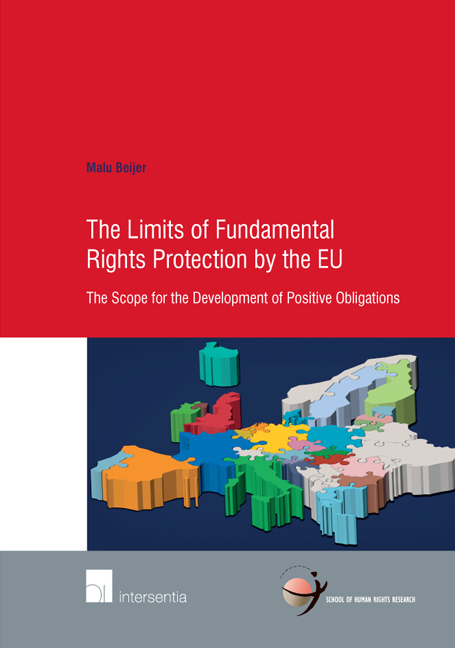 Limits of Fundamental Rights Protection by the EU
Limits of Fundamental Rights Protection by the EU Book contents
- Frontmatter
- About the Author
- Acknowledgements
- Contents
- Abbreviations
- Table of Cases
- Chapter 1 Introduction
- PART I THE CONCEPT OF POSITIVE OBLIGATIONS WITHIN THE CONTEXT OF THE EUROPEAN CONVENTION ON HUMAN RIGHTS
- PART II THE SCOPE FOR THE DEVELOPMENT OF POSITIVE OBLIGATIONS WITHIN THE CONTEXT OF EU LAW – AN ANALYSIS OF THE SPECIFIC PARAMETERS OF THE EU LEGAL ORDER AND THE EU SYSTEM OF FUNDAMENTAL RIGHTS PROTECTION
- PART III SYNTHESIS
- Bibliography
- Index
- Miscellaneous Endmatter
Chapter 1 - Introduction
Published online by Cambridge University Press: 27 September 2018
- Frontmatter
- About the Author
- Acknowledgements
- Contents
- Abbreviations
- Table of Cases
- Chapter 1 Introduction
- PART I THE CONCEPT OF POSITIVE OBLIGATIONS WITHIN THE CONTEXT OF THE EUROPEAN CONVENTION ON HUMAN RIGHTS
- PART II THE SCOPE FOR THE DEVELOPMENT OF POSITIVE OBLIGATIONS WITHIN THE CONTEXT OF EU LAW – AN ANALYSIS OF THE SPECIFIC PARAMETERS OF THE EU LEGAL ORDER AND THE EU SYSTEM OF FUNDAMENTAL RIGHTS PROTECTION
- PART III SYNTHESIS
- Bibliography
- Index
- Miscellaneous Endmatter
Summary
BACKGROUND TO THIS STUDY
TWO SUPRANATIONAL COURTS IN EUROPE DECIDING ON FUNDAMENTAL RIGHTS CASES
In today ‘ s pluralistic European legal order there are two supranational courts that both interpret the scope and the meaning of fundamental rights. Fundamental rights are a set of individuals rights and freedoms which, for example, include the right to life and freedom of expression, and can also be found in national constitutions. At the supranational level, the European Court of Human Rights (ECtHR) firstly plays an important role in interpreting the fundamental rights set out in the European Convention on Human Rights (ECHR or ‘ the Convention ‘). The ECtHR (and its predecessor, the European Commission of Human Rights), entered the scene in the 1950s, allowing individuals, as well as states, to bring claims regarding violations of the mainly civil and political rights of the Convention. From that moment on, the ECtHR has delivered judgments in a wide range of cases where fundamental rights were allegedly interfered with, and in those judgments it has fleshed out the meaning and scope of the rights laid down in the Convention. The ECtHR has also played an important part in the development of fundamental rights doctrines. The case-law of this Court has generated important effects on the way in which fundamental rights are protected at the national level. The states parties inter alia have had to make legislative changes in response to specific judgments of the ECtHR on individual cases. Today, the detailed case-law of the ECtHR and its fundamental rights doctrines are therefore of interest for various areas of law.
On the same European continent, albeit in respect of fewer states, the Court of Justice of the European Union (ECJ), now also plays a role in the protection of fundamental rights. The ECJ interprets and safeguards the correct application of the law of the European Union (EU). Its primary aim is not to ensure respect for fundamental rights, since it was established for different reasons. It was set up to focus on an economic type of integration between the European states. It has become clear, however, that actions taken by EU institutions and EU member states under EU law can affect the protection of fundamental rights.
- Type
- Chapter
- Information
- Limits of Fundamental Rights Protection by the EUThe Scope for the Development of Positive Obligations, pp. 1 - 16Publisher: IntersentiaPrint publication year: 2017
